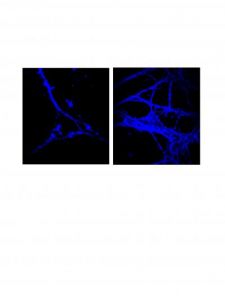Link between Huntington's and abnormal cholesterol levels in brain discovered
Dec 3, 2006 - 3:10:30 PM
, Reviewed by: Himanshu Tyagi
|
|
|
"Our discovery that the mutant Huntington's disease protein derails the cholesterol delivery system and causes cholesterol accumulation in neurons provides us with key results and solid clues to the mechanism of this disease"
|
By Mayo Clinic,
[RxPG] Mayo Clinic researchers have discovered a protein interaction that may explain how the deadly Huntington's disease affects the brain. The findings, published in and featured on the cover of the current issue of Human Molecular Genetics, show how the mutated Huntington's protein interacts with another protein to cause dramatic accumulation of cholesterol in the brain.
"Cholesterol is essential for promoting the connection network among brain cells and in maintaining their membrane integrity. Both the level of cholesterol and its delivery to the proper locations in the cell are essential for the survival of neurons," explains Mayo Clinic molecular biologist Cynthia McMurrary, Ph.D.
"Our discovery that the mutant Huntington's disease protein derails the cholesterol delivery system and causes cholesterol accumulation in neurons provides us with key results and solid clues to the mechanism of this disease," says Dr. McMurray. "Fully understanding the mechanism of toxicity is the key to developing treatments."
Huntington's disease -- sometimes called Huntington's chorea or St. Vitus' dance -- is a progressive, degenerative condition that causes nerve cells in the brain to waste away. Symptoms include uncontrolled movements, emotional disturbances and mental deterioration.
The mutant protein of Huntington's attacks the railroad system of brain cells and impairs transport of essential materials required for neurons to function. When this transportation system goes awry in the parts of the brain affected in Huntington's disease, motor skills, cognitive skills and even speech can be affected. A person cannot move without shaking, and physical control gradually deteriorates, often with accompanying personality changes, depression and increased risk of suicide. Those who have Huntington's commonly die from complications of the disease, such as falls or infections.
 |
| Mouse control neuron (left) and neuron showing cholesterol accumulation in Huntington's disease. |
Approximately 30,000 Americans have Huntington's disease. Another 150,000 carry the gene and have a 50 percent risk of passing it on to their children. The disease is easily diagnosed by a blood test, but symptoms usually don't appear until middle age.
Their findings, say the researchers, provide the first direct link between the Huntington's protein and the protein that controls capture and trafficking inside the cell. Their research suggests a possible means by which Huntington's disease functions.
Because no one knows how the disease is incurred or spreads, this new information is critical and establishes a clear path for investigations to move forward.
The Mayo researchers observed the abnormal accumulation of cholesterol in cultured neuronal cells in the laboratory and in the brains of animal models. They found that this happens only when the mutant Huntington's protein is expressed together with the molecule, caveolin-1. Caveolin-1 is the major structural protein of small vesicles called caveolae, which capture cholesterol and move it in and out of the neuronal membranes. When the researchers "knocked out" expression of caveolin, the neurons expressing mutant Huntington's protein stopped accumulating cholesterol.
Publication:
The findings are published in and featured on the cover of the current issue of Human Molecular Genetics
On the web:
www.mayoclinic.org 
|
Advertise in this space for $10 per month.
Contact us today.
|
 |
|
Subscribe to Huntington's Newsletter
|
|
|
|
Additional information about the news article
|
Others team members include key researcher Eugenia Trushina, Ph.D.; together with Raman Deep Singh, Ph.D.; Roy B. Dyer, Ph.D.; Sheng Cao, M.D.; Vijay H. Shah, M.D.; and Richard E. Pagano, Ph.D.; all of Mayo Clinic; and Robert G. Parton, Ph.D., of the University of Queensland. The research was supported by the Hereditary Disease Foundation, the National Institutes of Health, the American Heart Association and Mayo Clinic.
|
|
Feedback
|
For any corrections of factual information, to contact the editors or to send
any medical news or health news press releases, use
feedback form
|
Top of Page
|



